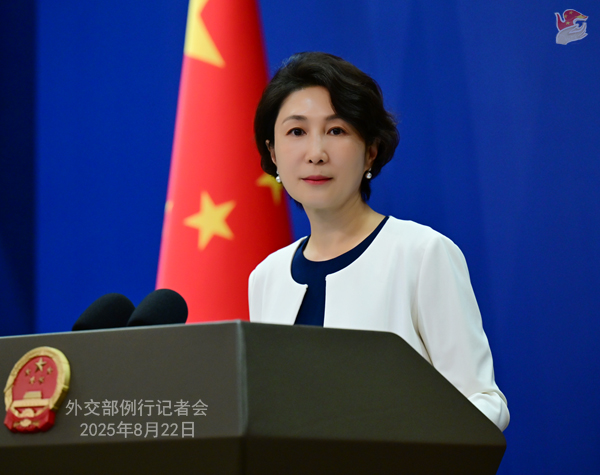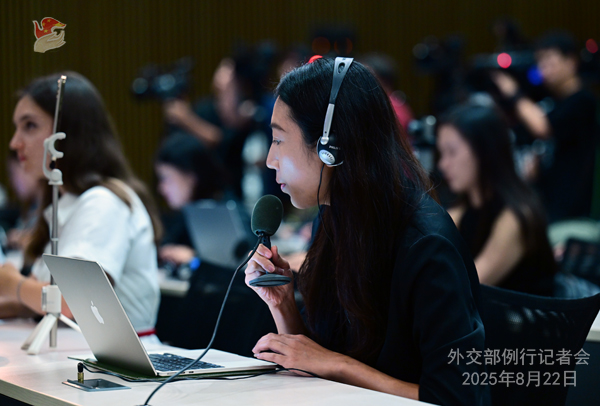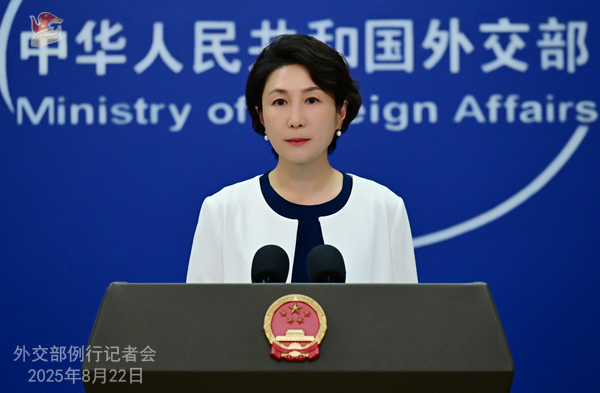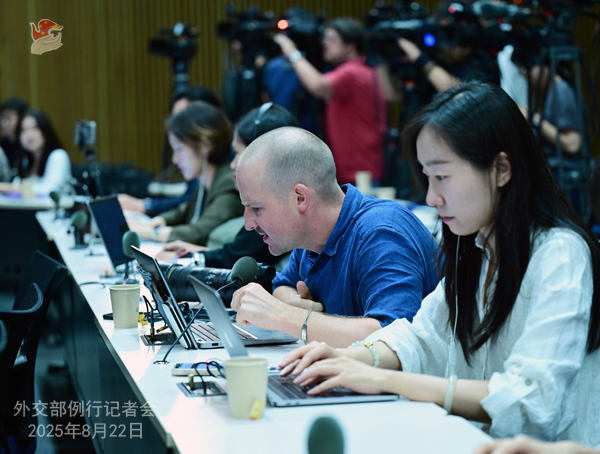
People’s Republic of China


CCTV: We noted Foreign Minister Wang Yi just concluded his visit to Pakistan. What’s your comment and can you further brief us on the visit?
Mao Ning: During his visit to Pakistan, Foreign Minister Wang Yi met with Pakistani President Asif Ali Zardari, Prime Minister Shehbaz Sharif and Chief of the Army Staff Asim Munir, and co-chaired the sixth round of the China-Pakistan Foreign Ministers’ Strategic Dialogue together with Deputy Prime Minister and Foreign Minister Mohammad Ishaq Dar.
Foreign Minister Wang Yi noted the China-Pakistan friendship has stood the test of time, and the all-weather strategic partnership remains unbreakable. The strategic cooperation between the two countries is significant to our common development and regional peace and stability. China and Pakistan have been at the forefront in building a community with a shared future in the neighborhood. China will work with Pakistan to follow the guidance of the important common understandings reached by the leaders of the two countries, deepen traditional friendship, strengthen strategic communication, jointly develop CPEC 2.0, and build an even closer China-Pakistan community with a shared future in the new era. China and Pakistan will always render each other high-level trust and support, focus on development and mutual benefit, safeguard security and deliver for the people, coordinate and collaborate and jointly respond to challenges.
This visit is the last leg of Foreign Minister Wang Yi’s three-nation trip to South Asia. South Asian countries are China’s close neighbors, and hold an important position in building a community with a shared future with our neighbors. Foreign Minister Wang Yi noted that the 21st century should be an era of faster development and revitalization for Asia and particularly South Asia. A peaceful, stable and prosperous South Asia serves the interests of all and is what people hope to see. China and South Asian countries are natural partners and enjoy ample space for cooperation. China is committed to fostering an amicable, secure and prosperous neighborhood, and upholds the principle of amity, sincerity, mutual benefit and inclusiveness and the vision of a shared future in developing relations with neighboring countries. China remains committed to pursuing mutual respect, accommodation, trust and success with South Asian countries.
RT TV: Russian Foreign Minister Lavrov said on August 20 that Russia supports providing strong security guarantee for Ukraine and agrees not to exclude UN Security Council members, including Western countries and China, from providing the so-called guarantee. However yesterday, on August 21, Zelenskyy said that Ukraine does not need China as one of the security guarantors. What is China’s view?
Mao Ning: China has always held an objective and just position and has always been fair and square on the Ukraine crisis, which is for all to see. It is essential to pursue common, comprehensive, cooperative and sustainable security and promote the political settlement of the Ukraine crisis. China stands ready to play a constructive role to that end.
China News Service: August 24 marks the 33rd anniversary of the establishment of diplomatic ties between China and the ROK. What’s China’s comment on growing its relations with the ROK?
Mao Ning: China and the ROK are and will always be each other’s neighbors. Over the past 33 years since the establishment of diplomatic ties, the comprehensive and rapid growth of bilateral relations demonstrates that a sound, stable and deepening China-ROK relationship is in the fundamental interests of the two peoples and conducive to peace, stability, development and prosperity in the region and beyond. China stands ready to work with the ROK to cherish the commitment made when establishing diplomatic ties, uphold good neighborliness and the friendly ties, work for mutual benefit, and elevate the strategic cooperative partnership to a higher level to deliver more tangibly for the two peoples.

News 1 Korea: My first question is, the ROK government announced today that from August 24 to 27, a special envoy team led by former National Assembly Speaker Park Byeong-seug will visit China, during which he will have talks with Vice President Han Zheng and Foreign Minister Wang Yi, and deliver a personal letter. The visit coincides with the 33rd anniversary of diplomatic relations between the ROK and China. What is China’s expectation and comment? My second question is, ROK’s National Assembly Speaker Woo Won-shik will attend commemorations on September 3 marking the 80th anniversary of the victory of the Chinese People’s War of Resistance against Japanese Aggression and the World Anti-Fascist War. What is China’s expectation and comment?
Mao Ning: On your first question, China welcomes the visit of former National Assembly Speaker Park Byeong-seug as President Lee Jae Myung’s special envoy. Our two sides are in communication on the specifics.
On your second question about inviting foreign leaders to the commemorative events and relevant arrangements, we will release timely information.
Beijing Daily: We’ve learned that recently, some Chinese students when entering the U.S. were groundlessly interrogated, harassed, badly treated or even repatriated by U.S. border control staff. What’s China’s comment?
Mao Ning: Recently, the U.S. has frequently carried out discriminatory, politically-driven and selective law enforcement against Chinese students arriving in the U.S. The students went through unfair treatment and were taken into small separate rooms for extended interrogation. Some were detained for more than 70 hours and repeatedly forced to answer questions that had nothing to do with their purpose of travel to the U.S. Some students’ visas were even revoked and they were banned from entering the country after being told they “might endanger national security.” The U.S.’s moves severely violate the legitimate and lawful rights and interests of Chinese nationals, impede the flow of people between the two countries, and dampen China-U.S. people-to-people exchanges. Every time such incidents occurred, China immediately protested to the U.S. and urged the U.S. to correct its wrongdoings.
The CPC and Chinese government always put the people first, and China’s diplomacy is people-centered. China would never allow any Chinese national traveling to the U.S. to be unfairly treated anytime anywhere. We urge the U.S. to face the issue squarely, take China’s concerns seriously, act on the U.S. leader’s statement of welcoming Chinese students, and stop the groundless interrogations, harassment and repatriation against them. China will continue working hard to protect the legitimate and lawful rights and interests of Chinese nationals going to the U.S.
Reuters: I have two questions. So about SCO. China has invited a number of leaders to SCO. Can the Foreign Ministry confirm as of today who has accepted the invitations? Second question, about Wang Yi’s visit to Afghanistan. He mentioned that China supports an early resumption of bilateral patrols in the Wakhan Corridor and urges Afghanistan to take firm actions to crack down on the East Turkistan Islamic Movement. Can we ask if talks for the resumption of bilateral patrols on the Wakhan Corridor have started and how will that take shape? And also have there been more growing concerns about the East Turkistan Islamic Movement recently?
Mao Ning: On your first question, Assistant Minister of Foreign Affairs Liu Bin shared relevant information at the press briefing this morning. More specifics will be released in due time.
On Foreign Minister Wang Yi’s visit to Afghanistan, relevant readouts have been released, which you may refer to. China supports Afghanistan in firmly combating terrorism, in particular terrorist groups such as ETIM, and keeping the region peaceful and stable.
The Paper: Recently, the U.S. State Department announced the visa restrictions on officials and their family members from African countries, Brazil, Cuba, Grenada, and former officials and their family members of Pan American Health Organization involved in the Cuban Government’s overseas medical missions. He stated that the United States is committed to ending Cuba’s overseas medical missions as an exploitative behavior of forced labor, warning countries cooperating with Cuba to “think twice.” What is China’s comment on this?
Mao Ning: We noted that according to statistics of the government of Cuba, during the past 60-plus years, Cuba sent over 600,000 medical personnel to over 60 countries, provided medical services for over 230 million people and performed over 17 million operations and surgeries, which saved the lives of more than 12 million people. Cuba’s overseas medical cooperation plays an important role in the health systems of Latin American and Caribbean countries as well as African countries, and is welcomed by the governments and peoples of the relevant countries.
The so-called “forced labor” has become a false pretext and tool of hegemony for the United States to suppress other countries. Relevant measures of the U.S. are an extension and escalation of its over 60 years of unpopular sanctions and blockade on Cuba. Political figures and people from all walks of life in relevant regions have expressed their clear opposition or concern.
China opposes coercive diplomacy and urges the U.S. to immediately stop the blockade and sanctions on Cuba in any name and do more things that help improve relations with Cuba and promote regional peace and stability.

AFP: Assistant Foreign Minister Liu Bin announced this morning the list of some foreign representatives who will attend the SCO summit. He did not mention any official from Afghanistan, which is an observer country of the SCO. Does this mean that Afghanistan is not invited to the summit?
Mao Ning: On the participation of foreign leaders in the SCO summit, Assistant Foreign Minister Liu Bin offered detailed information this morning. I have nothing to add.
Antara: Another question about the SCO, because the Ministry of Foreign Affairs already announced that there will be at least 22 leaders from 22 countries, including the non-permanent members, observers and also non-dialogue partners, such as Indonesia, Malaysia, Viet Nam and Cambodia and also Laos. Does this indicate that the SCO is considering the admission of new member states into the organization?
Mao Ning: The Shanghai Cooperation Organization will uphold the principle of openness and inclusiveness and keep its doors open to all countries who identify with the Shanghai spirit. The SCO is always prepared to welcome more countries that share its vision to join the big family of the SCO.
AFP: The African country of Nigeria said yesterday it has deported 60 Chinese nationals convicted of cyber terrorism and internet fraud. Did you collaborate with the Nigerian authorities on this case? And how will you deal with these Chinese nationals?
Mao Ning: The Chinese government always asks Chinese nationals overseas to act in strict accordance with local laws and regulations and supports host countries in lawfully combating criminal activities. Chinese diplomatic and consular missions in Nigeria are closely following the case. They have conducted consular visits, maintained communication with Nigeria on ensuing matters, and requested the country to protect the safety and lawful rights and interests of relevant Chinese citizens.
Bloomberg: A question on U.S. sanctions by the U.S. Treasury Department against two Chinese ports for facilitating the transportation of Iranian oil. Does the Foreign Ministry have any comment on this latest sanctions on Chinese ports by the U.S. side?
Mao Ning: China opposes unilateral illicit sanctions that have no basis in international law or authorization of the UN Security Council. We urge the U.S. to abandon the wrong practice of arbitrarily resorting to sanctions. Countries’ normal cooperation with Iran within the framework of international law is legitimate and justified. China will do what is necessary to safeguard the lawful rights and interests of Chinese companies and citizens.
AFP: A U.S. navy sailor has been convicted of espionage for selling military secrets to China. At least that’s what the U.S. Department of Justice said yesterday. Have you communicated with the U.S. on this issue and what is your position on this issue?
Mao Ning: I’m not aware of what you mentioned.
Bloomberg: A question on Nvidia which, according to reports, has instructed component suppliers to stop production related to the H20 chip. This is after earlier reports in recent days and weeks that the Chinese side was discouraging Chinese companies from using H20 chips. Does the Foreign Ministry have any comments on the latest reports about production related to H20 being stopped by Nvidia?
Mao Ning: I’d refer you to competent authorities on this issue. Let me say more broadly that we believe all countries need to jointly keep global industrial and supply chains stable and unimpeded.
AFP: Got a question related to sports. Saudi Arabian officials have discussed approaching China about relocating the 2029 Asian Winter Games. Is China willing to consider hosting the 2029 Asian Winter Games edition if that were the case?
Mao Ning: I have not heard about what you mentioned. We support Saudi Arabia in hosting the 2029 Asian Winter Games.




